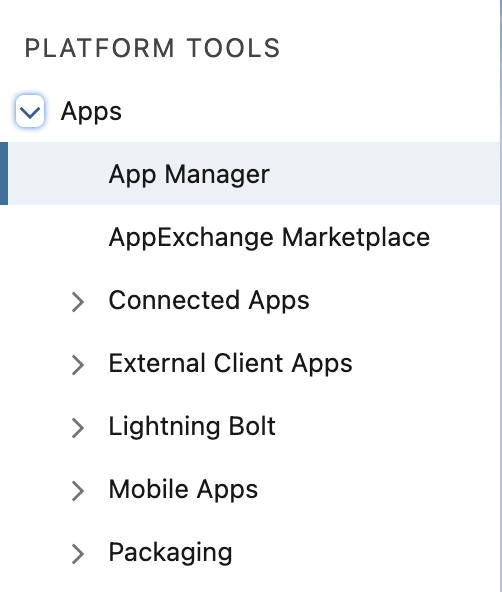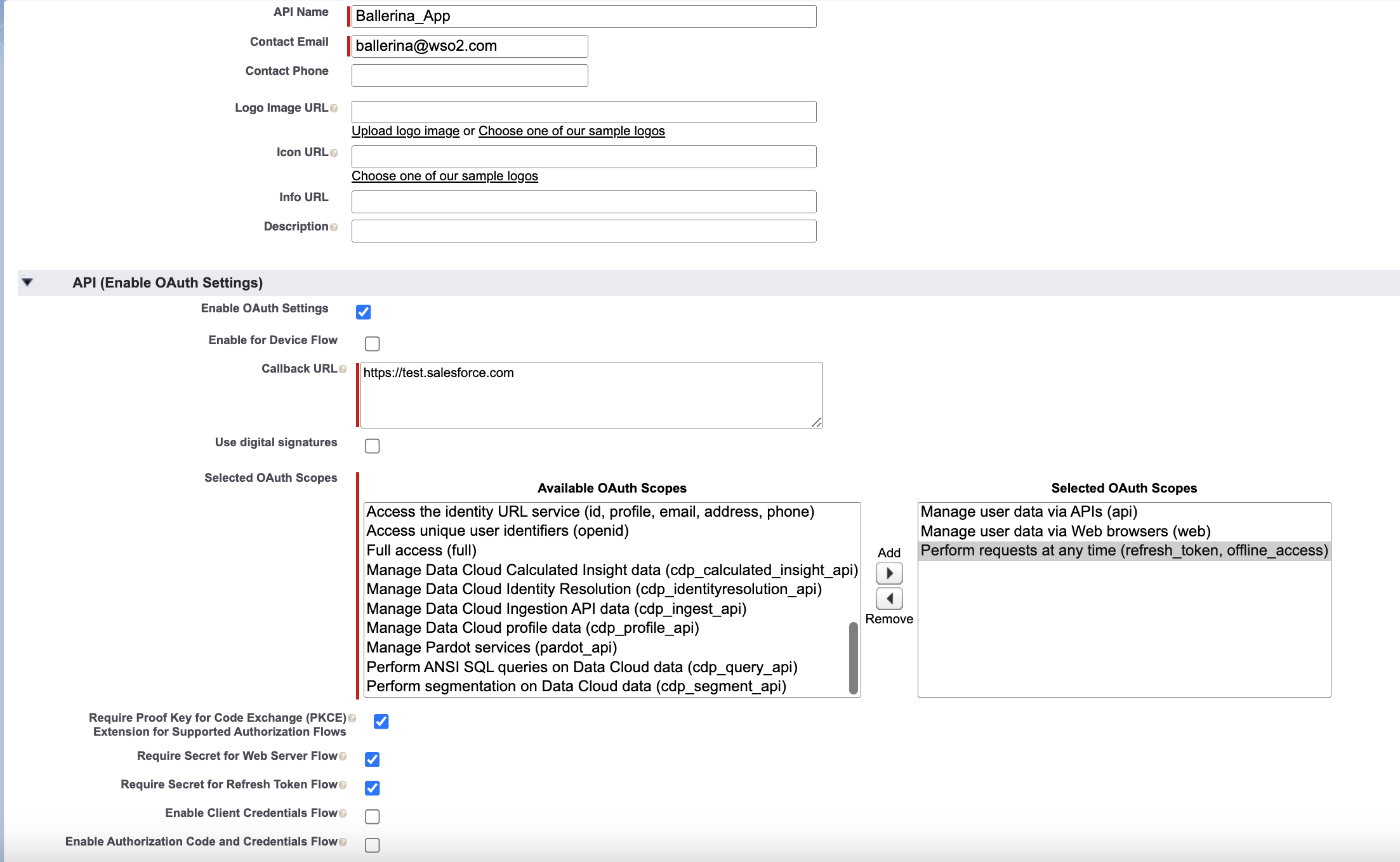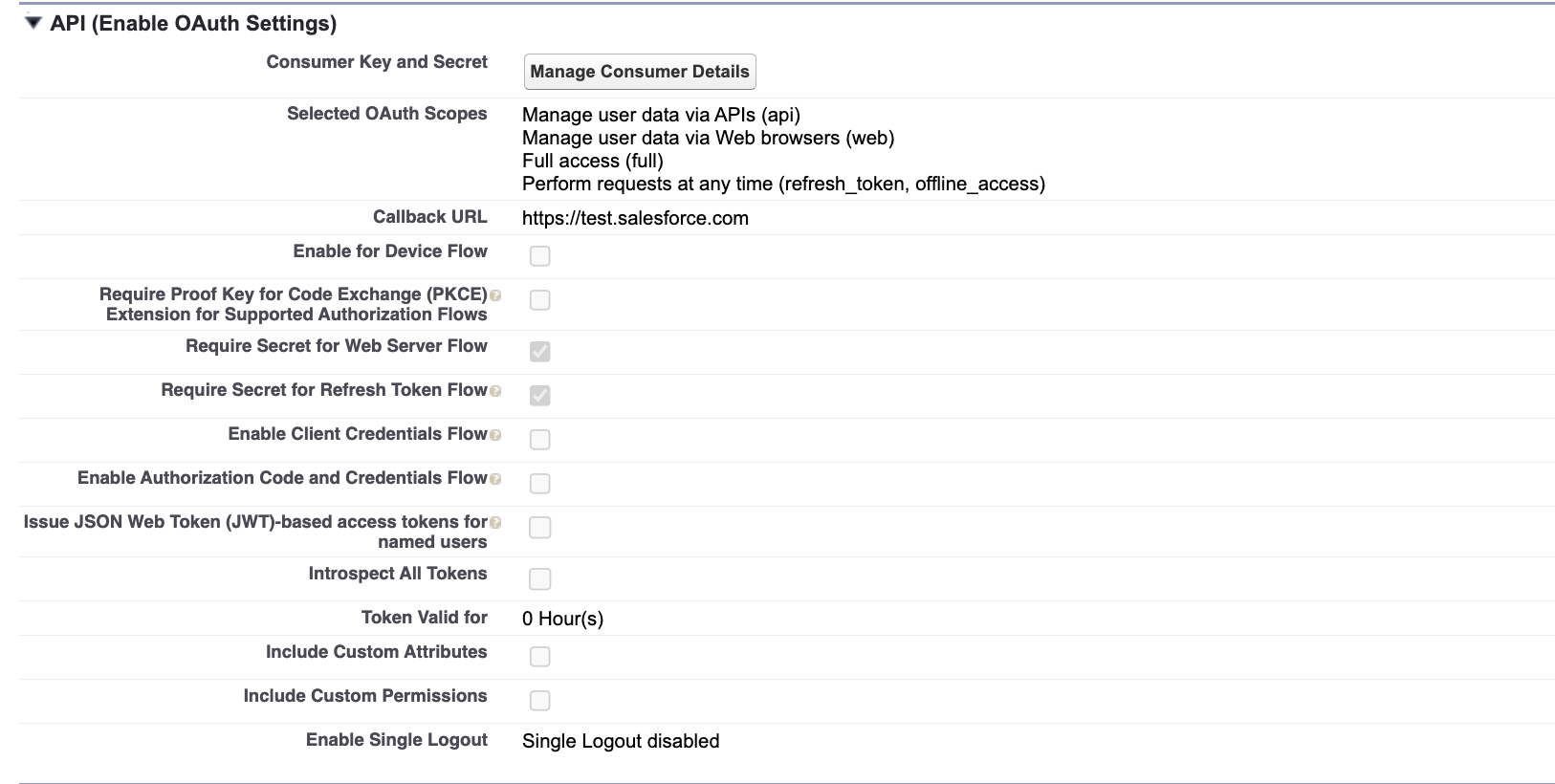Salesforce Sales Cloud is one of the leading Customer Relationship Management(CRM) software, provided by Salesforce.Inc. Salesforce enable users to efficiently manage sales and customer relationships through its APIs, robust and secure databases, and analytics services. Sales cloud provides serveral API packages to make operations on sObjects and metadata, execute queries and searches, and listen to change events through API calls using REST, SOAP, and CometD protocols.
Ballerina Salesforce connector supports Salesforce v59.0 REST API, Salesforce v59.0 SOAP API, Salesforce v59.0 APEX REST API, Salesforce v59.0 BULK API, and Salesforce v59.0 BULK V2 API.
-
Create a Salesforce account with the REST capability.
-
Go to Setup --> Apps --> App Manager

-
Create a New Connected App.

- Here we will be using https://test.salesforce.com as we are using sandbox environment. Users can use https://login.salesforce.com for normal usage.

-
After the creation user can get consumer key and secret through clicking on the
Manage Consumer Detailsbutton.
-
Next step would be to get the token.
- Log in to salesforce in your preferred browser and enter the following url.
https://<YOUR_INSTANCE>.salesforce.com/services/oauth2/authorize?response_type=code&client_id=<CONSUMER_KEY>&redirect_uri=<REDIRECT_URL>
-
Allow access if an alert pops up and the browser will be redirected to a Url like follows.
https://login.salesforce.com/?code=<ENCODED_CODE> -
The code can be obtained after decoding the encoded code
- Get Access and Refresh tokens
-
Following request can be sent to obtain the tokens.
curl -X POST https://<YOUR_INSTANCE>.salesforce.com/services/oauth2/token?code=<CODE>&grant_type=authorization_code&client_id=<CONSUMER_KEY>&client_secret=<CONSUMER_SECRET>&redirect_uri=https://test.salesforce.com/ -
Tokens can be obtained from the response.
-
To use the Salesforce connector in your Ballerina application, modify the .bal file as follows:
Import the ballerinax/salesforce package into the Ballerina project.
import ballerinax/salesforce;Create a salesforce:ConnectionConfig with the obtained OAuth2 tokens and initialize the connector with it.
salesforce:ConnectionConfig config = {
baseUrl: baseUrl,
auth: {
clientId: clientId,
clientSecret: clientSecret,
refreshToken: refreshToken,
refreshUrl: refreshUrl
}
};
salesforce:Client salesforce = check new (config);- Now you can utilize the available operations. Note that they are in the form of remote operations.
Following is an example on how to create a record using the connector.
salesforce:CreationResponse response = check
salesforce->create("Account", {
"Name": "IT World",
"BillingCity": "New York"
});
- To integrate the Salesforce listener into your Ballerina application, update the .bal file as follows:
Create an instance of salesforce:Listener using your Salesforce username, password, security token, and subscribe channel name.
import ballerinax/salesforce;
salesforce:ListenerConfig listenerConfig = {
auth: {
username: "username",
password: "password" + "security token"
}
};
listener salesforce:Listener eventListener = new (listenerConfig);Implement the listener’s remote functions and specify the channel name to be subscribed to as the service name.
import ballerina/io;
import ballerinax/salesforce;
salesforce:ListenerConfig listenerConfig = {
auth: {
username: "username",
password: "password" + "security token"
}
};
listener salesforce:Listener eventListener = new (listenerConfig);
service "/data/ChangeEvents" on eventListener {
remote function onCreate(salesforce:EventData payload) {
io:println("Created " + payload.toString());
}
remote isolated function onUpdate(salesforce:EventData payload) {
io:println("Updated " + payload.toString());
}
remote function onDelete(salesforce:EventData payload) {
io:println("Deleted " + payload.toString());
}
remote function onRestore(salesforce:EventData payload) {
io:println("Restored " + payload.toString());
}
}- Integrate custom SObject types
To seamlessly integrate custom SObject types into your Ballerina project, you have the option to either generate a package using the Ballerina Open API tool or utilize the ballerinax/salesforce.types module. Follow the steps given here based on your preferred approach.
import ballerinax/salesforce.types;
public function main() returns error? {
types:AccountSObject accountRecord = {
Name: "IT World",
BillingCity: "New York"
};
salesforce:CreationResponse res = check salesforce->create("Account", accountRecord);
}- Use following command to compile and run the Ballerina program.
bal run
The salesforce connector provides practical examples illustrating usage in various scenarios. Explore these examples below, covering use cases like creating sObjects, retrieving records, and executing bulk operations.
-
Salesforce REST API use cases - How to employ REST API of Salesforce to carryout various tasks.
-
Salesforce Bulk API use cases - How to employ Bulk API of Salesforce to execute Bulk jobs.
-
Salesforce Bulk v2 API use cases - How to employ Bulk v2 API to execute an ingest job.
-
Salesforce APEX REST API use cases - How to employ APEX REST API to create a case in Salesforce.